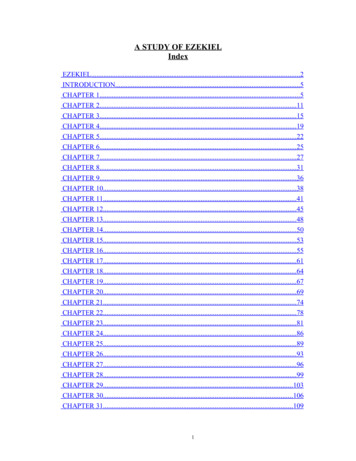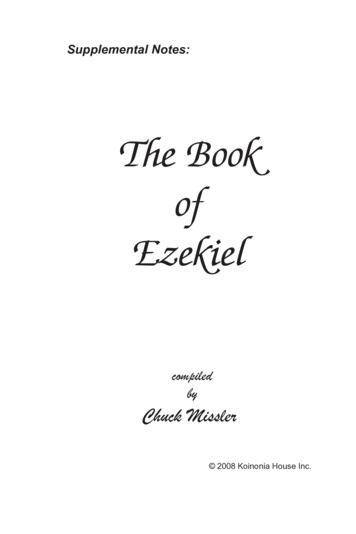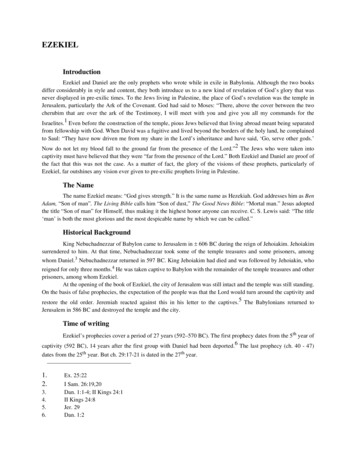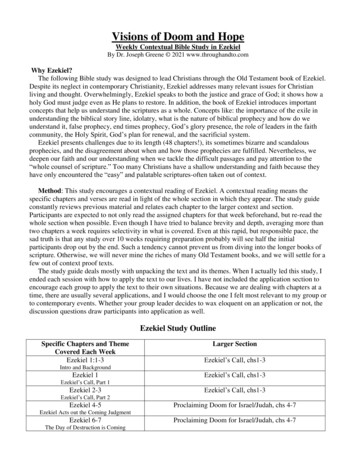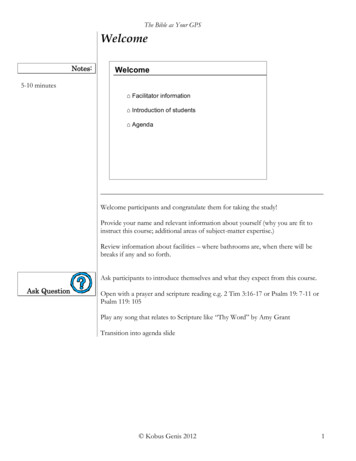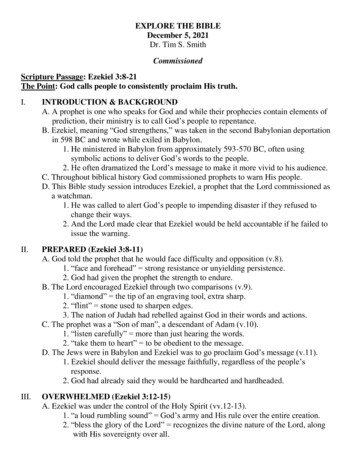
Transcription
EzekielA Vision of God’s Glory1:1 In the thirtieth year, on the fifth day of thefourth month, while I was among the exiles atthe Kebar River, the heavens opened and I sawa divine vision. 1:2 (On the fifth day of the month– it was the fifth year of King Jehoiachin’s exile– 1:3 the word of the Lord came to the priest Ezekiel the son of Buzi, at the Kebar River in theland of the Babylonians. The hand of the Lordcame on him there).1:4 As I watched, I noticed10 a windstorm11coming from the north – an enormous cloud, withlightning flashing,12 such that bright light13 rimmedit and came from14 it like glowing amber15 from themiddle of a fire. 1:5 In the fire16 were what lookedlike17 four living beings.18 In their appearance theyhad human form,19 1:6 but each had four faces andfour wings. 1:7 Their legs were straight, but the solesof their feet were like calves’ feet. They gleamed20like polished bronze. 1:8 They had human hands21under their wings on their four sides. As for thefaces and wings of the four of them, 1:9 their sn The meaning of the thirtieth year is problematic. Sometake it to mean the age of Ezekiel when he prophesied (e.g.,Origen). The Aramaic Targum explains the thirtieth year as thethirtieth year dated from the recovery of the book of the Torah in the temple in Jerusalem (2 Kgs 22:3-9). The numberseems somehow to be equated with the fifth year of Jehoiachin’s exile in 1:2, i.e., 593 b.c. sn The Assyrians started the tactic of deportation, thelarge-scale forced displacement of conquered populations, inorder to stifle rebellions. The task of uniting groups of deportees, gaining freedom from one’s overlords and returning toretake one’s own country would be considerably more complicated than living in one’s homeland and waiting for an opportune moment to drive out the enemy’s soldiers. The Babylonians adopted this practice also, after defeating the Assyrians. The Babylonians deported Judeans on three occasions.The practice of deportation was reversed by the Persian conquerors of Babylon, who gained favor from their subjects forallowing them to return to their homeland and, as polytheists,sought the favor of the gods of the various countries whichhad come under their control. sn The Kebar River is mentioned in Babylonian texts fromthe city of Nippur in the fifth century b.c. It provided artificialirrigation from the Euphrates. sn For the concept of the heavens opened in later literature, see 3 Macc 6:18; 2 Bar. 22:1; T. Levi 5:1; Matt 3:16;Acts 7:56; Rev 19:11. tn Or “saw visions from God.” References to divine visionsoccur also in Ezek 8:3; 40:2 sn The prophet’s name, Ezekiel, means in Hebrew “MayGod strengthen.” tn Or “to Ezekiel son of Buzi the priest.” tn Heb “Chaldeans.” The name of the tribal group rulingBabylon, “Chaldeans” is used as metonymy for the whole empire of Babylon. The Babylonians worked with the Medes todestroy the Assyrian Empire near the end of the 7th centuryb.c. Then, over the next century, the Babylonians dominatedthe West Semitic states (such as Phoenicia, Aram, Moab,Edom, and Judah in the modern countries of Syria, Lebanon,Jordan, and Israel) and made incursions into Egypt. tn Or “power.”sn Hand in the OT can refer metaphorically to power, authority, or influence. In Ezekiel God’s “hand” being on the prophetis regularly associated with communication or a vision fromGod (3:14, 22; 8:1; 37:1; 40:1).10 tn The word ( ִה ּנֵה hinneh, traditionally “behold”) indicatesbecoming aware of something and has been translated hereas a verb.11 sn Storms are often associated with appearances ofGod (see Nah 1:3; Ps 18:12). In some passages, the “storm”( ְסעָ רָ ה , sÿ’arah) may be a whirlwind (Job 38:1, 2 Kgs 2:1).12 tn Heb “fire taking hold of itself,” perhaps repeatedly.The phrase occurs elsewhere only in Exod 9:24 in associationwith a hailstorm. The LXX interprets the phrase as fire flashinglike lightning, but it is possibly a self-sustaining blaze of divineorigin. The LXX also reverses the order of the descriptors, i.e.,“light went around it and fire flashed like lightning within it.”13 tn Or “radiance.” The term also occurs in 1:27b.14 tc Or “was in it”; cf. LXX ἐν τῷ μέσῳ αὐτοῦ (en tw meswautou, “in its midst”).15 tn The LXX translates ( ַח ׁ ְש ַמל khashmal) with the wordἤλεκτρον (hlektron, “electrum”; so NAB), an alloy of silverand gold, perhaps envisioning a comparison to the glow ofmolten metal.16 tc Heb “from its midst” ( ִמ ּתוֹכָ ּה , mitokhah). The LXX readsἐν τῷ μέσῳ (en tw mesw, “in the midst of it”). The LXX alsoreads ἐν for ( ִמ ּתו ְֹך mitokh) in v. 4. The translator of the LXX ofEzekiel either read ( ְּבתו ְֹך bÿtokh, “within”) in his Hebrew exemplar or could not imagine how ִמ ּתו ְֹך could make sense and sochose to use ἐν. The Hebrew would be understood by adding“from its midst emerged the forms of four living beings.”17 tn Heb “form, figure, appearance.”18 tn The Hebrew term is feminine plural yet thirty-three ofthe forty-five pronominal suffixes and verbal references whichrefer to the living beings in the chapter are masculine plural.The grammatical vacillation between masculine and feminineplurals suggests the difficulty Ezekiel had in penning thesewords as he was overcome by the vision of God. In ancientNear Eastern sculpture very similar images of part-human,part-animal creatures serve as throne and sky bearers. For adiscussion of ancient Near Eastern parallels, see L. C. Allen,Ezekiel (WBC), 1:26-31. Ezekiel’s vision is an example of contextualization, where God accommodates his self-revelationto cultural expectations and norms.19 sn They had human form may mean they stood erect.20 sn The Hebrew verb translated gleamed occurs onlyhere in the OT.21 tc The MT reads “his hand” while many Hebrew mss aswell as the Qere read “hands of.” Two similar Hebrew letters,vav and yod, have been confused. 1578
1579 Ezekiel 1:23wings touched each other; they did not turn as theymoved, but went straight ahead. 1:10 Their faces had this appearance: Each ofthe four had the face of a man, with the face ofa lion on the right, the face of an ox on the leftand also the face of an eagle. 1:11 Their wingswere spread out above them; each had two wingstouching the wings of one of the other beings oneither side and two wings covering their bodies.1:12 Each moved straight ahead – wherever thespirit would go, they would go, without turning asthey went. 1:13 In the middle of the living beingswas something like burning coals of fire or liketorches. It moved back and forth among the livingbeings. It was bright, and lightning was flashingout of the fire. 1:14 The living beings moved backward and forward as quickly as flashes of lightning. 1:15 Then I looked, and I saw one wheel10on the ground11 beside each of the four beings.1:16 The appearance of the wheels and theirconstruction12 was like gleaming jasper,13 and tn Heb “They each went in the direction of one of his faces.” tc The MT has an additional word at the beginning of v.11, וּפנֵיהֶ ם ְ (ufÿnehem, “and their faces”), which is missing fromthe LXX. As the rest of the verse only applies to wings, “theirfaces” would have to somehow be understood in the previousclause. But this would be very awkward and is doubly problematic since “their faces” are already introduced as the topicat the beginning of v. 10. The Hebrew scribe appears to havecopied the phrase “and their faces and their wings” from v.8, where it introduces the content of 9-11. Only “and (as for)their wings” belongs here. tn See the note on “straight ahead” in v. 9. tn Or “wind.” tc The MT reads “and the form of the creatures” ( וּדמוּת ְ הַ ַחיּ וֹת , udÿmut hakhayyot). The LXX reads “and in the midst ofthe creatures,” suggesting an underlying Hebrew text of וּמ ּתו ְֹך ִ ( הַ ַחיּ וֹת umittokh hakhayyot). The subsequent description ofsomething moving among the creatures supports the LXX. tc The MT reads “and the form of the creatures – theirappearance was like burning coals of fire.” The LXX reads “inthe midst of the creatures was a sight like burning coals offire.” The MT may have adjusted “appearance” to “their appearance” to fit their reading of the beginning of the verse(see the tc note on “in the middle”). See M. Greenberg, Ezekiel (AB), 1:46. sn Burning coals of fire are also a part of David’s poeticdescription of God’s appearance (see 2 Sam 22:9, 13; Ps18:8). tc The LXX omits v. 14 and may well be correct. The versemay be a later explanatory gloss of the end of v. 13 which wascopied into the main text. See M. Greenberg, Ezekiel (AB),1:46.tn Lit., “like the appearance of lightning.” The Hebrew termtranslated “lightning” occurs only here in the OT. In postbiblical Hebrew the term refers to a lightning flash. tc The MT adds “at the living beings” which is absent fromthe LXX.10 sn Another vision which includes wheels on thrones occurs in Dan 7:9. Ezek 10 contains a vision similar to this one.11 tn The Hebrew word may be translated either “earth” or“ground” in this context.12 tc This word is omitted from the LXX.13 tn Heb “Tarshish stone.” The meaning of this term isuncertain. The term has also been translated “topaz” (NEB);“beryl” (KJV, NASB, NRSV); or “chrysolite” (RSV, NIV).all four wheels looked alike. Their structure waslike a wheel within a wheel.14 1:17 When theymoved they would go in any of the four directions they faced without turning as they moved.1:18 Their rims were high and awesome,15 andthe rims of all four wheels were full of eyes allaround.1:19 When the living beings moved, thewheels beside them moved; when the living beings rose up from the ground, the wheels roseup too. 1:20 Wherever the spirit16 would go, theywould go,17 and the wheels would rise up besidethem because the spirit18 of the living being wasin the wheel. 1:21 When the living beings moved,the wheels moved, and when they stopped moving, the wheels stopped.19 When they rose up fromthe ground, the wheels rose up from the ground;the wheels rose up beside them because the spiritof the living being was in the wheel.1:22 Over the heads of the living beingswas something like a platform,20 glitteringawesomely like ice,21 stretched out over theirheads. 1:23 Under the platform their wings werestretched out, each toward the other. Each ofthe beings also had two wings covering22 its14 tn Or “like a wheel at right angles to another wheel.”Some envision concentric wheels here, while others propose“a globe-like structure in which two wheels stand at rightangles” (L. C. Allen, Ezekiel [WBC], 1:33-34). The descriptiongiven in v. 17 favors the latter idea.15 tc The MT reads וְיִר ָאה לָ הֶ ם ְ (vÿyir’ah lahem, “and fear belonged to them”). In a similar vision in 10:12 the wheels aredescribed as having spokes ( יִדֵ יהֶ ם , yideyhem). That parallelwould suggest ( יָדוֹת yadot) here (written ָידֹת without the mater). By positing both a ד / ( ר dalet/resh) confusion and a ת / ה (hey/khet) confusion the form was read as ( וְ יָרֵ ה vÿyareh) andwas then misunderstood and subsequently written as וְיִר ָאה ְ(vÿyir’ah) in the MT. The reading וְיִר ָאה ְ does not seem to fit thecontext well, though in English it can be made to sound asif it does. See W. H. Brownlee, Ezekiel 1-19 (WBC), 8-9. TheLXX reads καὶ εἶδον αὐτά (kai eidon auta, “and I saw”),which assumes ( ו ֵָארֶ א va’ere’). The existing consonants of theMT may also be read as “it was visible to them.”16 tn Or “wind”; the same Hebrew word can be translatedas either “wind” or “spirit” depending on the context.17 tc The MT adds the additional phrase “the spirit wouldgo,” which seems unduly redundant here and may be dittographic.18 tn Or “wind.” The Hebrew is difficult since the text presents four creatures and then talks about “the spirit” (singular) of “the living being” (singular). According to M. Greenberg (Ezekiel [AB], 1:45) the Targum interprets this as “will.”Greenberg views this as the spirit of the one enthroned abovethe creatures, but one would not expect the article when theone enthroned has not yet been introduced.19 tc The LXX reads “when it went, they went; when it stood,they stood.”tn Heb “when they went, they went; when they stood, theystood.”20 tn Or “like a dome” (NCV, NRSV, TEV).21 tn Or “like crystal” (NRSV, NLT).22 tc Heb “each had two wings covering and each had twowings covering,” a case of dittography. On the analogy of v. 11and the support of the LXX, which reads the same for v. 11and this verse, one should perhaps read “each had two wingstouching another being and each had two wings covering.”
Ezekiel 1:241580body. 1:24 When they moved, I heard the sound oftheir wings – it was like the sound of rushing waters, or the voice of the Almighty, or the tumult of an army. When they stood still, they loweredtheir wings.1:25 Then there was a voice from above theplatform over their heads when they stood still. 1:26 Above the platform over their heads wassomething like a sapphire shaped like a throne.High above on the throne was a form that appeared to be a man. 1:27 I saw an amber glow likea fire enclosed all around from his waist up. Fromhis waist down I saw something that looked likefire. There was a brilliant light around it, 1:28 likethe appearance of a rainbow in the clouds after therain. This was the appearance of the surroundingbrilliant light; it looked like the glory of the Lord.When I saw it, I threw myself face down, and Iheard a voice speaking.me on my feet, and I heard the one speaking tome.2:3 He said to me, “Son of man, I am sending you to the house11 of Israel, to rebellious nations12 who have rebelled against me; both theyand their fathers have revolted13 against me to thisvery day. 2:4 The people14 to whom I am sending you are obstinate and hard-hearted,15 and youmust say to them, ‘This is what the sovereignLord says.’16 2:5 And as for them,17 whether theylisten18 or not – for they are a rebellious19 house20– they will know that a prophet has been amongthem. 2:6 But you, son of man, do not fear them,and do not fear their words – even though briers21and thorns22 surround you and you live amongscorpions – do not fear their words and do notEzekiel’s Commission2:1 He said to me, “Son of man, stand onyour feet and I will speak with you.” 2:2 As hespoke to me, a wind10 came into me and stood tn Heb “Shaddai” (probably meaning “one of the mountain”), a title that depicts God as the sovereign ruler of theworld who dispenses justice. The Old Greek translation omitted the phrase “voice of the Almighty.” tn The only other occurrence of the Hebrew word translated “tumult” is in Jer 11:16. It indicates a noise like that ofthe turmoil of a military camp or the sound of an army on themarch. tc The MT continues “when they stood still they loweredtheir wings,” an apparent dittography from the end of v. 24.The LXX commits haplography by homoioteleuton, leaving outvv. 25b and 26a by skipping from ֹאשם ָ ׁ ( ר rosham) in v. 25 to ֹאשם ָ ׁ ר in v. 26. tn See Ezek 1:4. tc The LXX lacks this phrase. Its absence from the LXXmay be explained as a case of haplography resulting fromhomoioteleuton, skipping from ( ְּכ ַמ ְר ֵאה kÿmar’eh) to ִמ ּ ַמ ְר ֵאה (mimmar’eh). On the other hand, the LXX presents a muchmore balanced verse structure when it is recognized that thefinal words of this verse belong in the next sentence. sn Reference to the glowing substance and the brilliantlight and storm phenomena in vv. 27-28a echoes in reverseorder the occurrence of these phenomena in v. 4. tn The vision closes with the repetition of the verb “I saw”from the beginning of the vision in 1:4. sn The phrase son of man occurs ninety-three times inthe book of Ezekiel. It simply means “human one,” and distinguishes the prophet from the nonhuman beings that arepresent in the world of his vision. tc The phrase “as he spoke to me” is absent from theLXX.10 tn Or “spirit.” NIV has “the Spirit,” but the absence ofthe article in the Hebrew text makes this unlikely. Elsewherein Ezekiel the Lord’s Spirit is referred to as “the Spirit of theLord” (11:5; 37:1), “the Spirit of God” (11:24), or “my (that is,the Lord’s) Spirit” (36:27; 37:14; 39:29). Some identify the“spirit” of 2:2 as the spirit that energized the living beings,however, that “spirit” is called “the spirit” (1:12, 20) or “thespirit of the living beings” (1:20-21; 10:17). Still others seethe term as referring to an impersonal “spirit” of strength orcourage, that is, the term may also be understood as a disposition or attitude. The Hebrew word often refers to a windin Ezekiel (1:4; 5:10, 12; 12:4; 13:11, 13; 17:10, 21; 19:12;27:26; 37:9). In 37:5-10 a “breath” originates in the “fourwinds” and is associated with the Lord’s life-giving breath (seev. 14). This breath enters into the dry bones and gives themlife. In a similar fashion the breath of 2:2 (see also 3:24) energizes paralyzed Ezekiel. Breath and wind are related. On theone hand it is a more normal picture to think of breath ratherthan wind entering someone, but since wind represents anexternal force it seems more likely for wind rather than breathto stand someone up (unless we should understand it as adisposition). It may be that one should envision the breath ofthe speaker moving like a wind to revive Ezekiel, helping himto regain his breath and invigorating him to stand. A wind alsotransports the prophet from one place to another (3:12, 14;8:3; 11:1, 24; 43:5).11 tc The Hebrew reads “sons of,” while the LXX reads“house,” implying the more common phrase in Ezekiel. Eithercould be abbreviated with the first letter ( ב bet). In preparationfor the characterization “house of rebellion,” in vv. 5, 6, and 8,“house” is preferred (L. C. Allen, Ezekiel [WBC], 1:10 and W.Zimmerli, Ezekiel [Hermeneia], 2:564-65).12 tc Heb “to the rebellious nations.” The phrase “to therebellious nations” is omitted in the LXX. Elsewhere in Ezekiel the singular word “nation” is used for Israel (36:13-15;37:22). Here “nations” may have the meaning of “tribes” orrefer to the two nations of Israel and Judah.13 tc This word is omitted from the LXX.tn The Hebrew term used here is the strongest word available for expressing a covenant violation. The word is used inthe diplomatic arena to express a treaty violation (2 Kgs 1:1;3:5, 7).14 tn Heb “sons.” The word choice may reflect treaty idiom,where the relationship between an overlord and his subjectscan be described as that of father and son.15 tc Heb “stern of face and hard of heart.” The phrases“stern of face” and “hard of heart” are lacking in the LXX.16 tn The phrase “thus says [the Lord]” occurs 129 timesin Ezekiel; the announcement is identical to the way messengers often introduced their messages (Gen 32:5; 45:9; Exod5:10; Num 20:14; Judg 11:15).17 tn Heb “they”; the phrase “And as for them” has beenused in the translation for clarity.18 tn The Hebrew word implies obedience rather than merehearing or paying attention.19 tn This Hebrew adjective is also used to describe the Israelites in Num 17:25 HT (17:10 ET) and Isa 30:9.20 sn The book of Ezekiel frequently refers to the Israelitesas a rebellious house (Ezek 2:5, 6, 8; 3:9, 26-27; 12:2-3, 9,25; 17:12; 24:3).21 tn The Hebrew term occurs only here in the OT.22 tn The Hebrew term is found elsewhere in the OT only inEzek 28:24.sn Here thorns may be a figure for hostility (Ezek 28:24; Mic7:4).
1581 Ezekiel 3:15be terrified of the looks they give you, for they area rebellious house! 2:7 You must speak my wordsto them whether they listen or not, for they are rebellious. 2:8 As for you, son of man, listen to whatI am saying to you: Do not rebel like that rebellious house! Open your mouth and eat what I amgiving you.”2:9 Then I looked and realized a hand wasstretched out to me, and in it was a written scroll.2:10 He unrolled it before me, and it had writingon the front and back; written on it were laments,mourning, and woe.3:1 He said to me, “Son of man, eat what yousee in front of you – eat this scroll – and then goand speak to the house of Israel.” 3:2 So I openedmy mouth and he fed me the scroll.3:3 He said to me, “Son of man, feed yourstomach and fill your belly with this scroll I amgiving to you.” So I ate it, and it was sweet likehoney in my mouth.3:4 He said to me, “Son of man, go to the houseof Israel and speak my words to them. 3:5 For youare not being sent to a people of unintelligiblespeech and difficult language, but to the houseof Israel – 3:6 not to many peoples of unintelligiblespeech and difficult language, whose words youcannot understand – surely if10 I had sent you tothem, they would listen to you! 3:7 But the houseof Israel is unwilling to listen to you,11 becausethey are not willing to listen to me,12 for the wholehouse of Israel is hard-headed and hard-hearted.13 tn Heb “of their faces.” tn Heb “on the face.” sn Written on the frontand back. While it was commonfor papyrus scrolls to have writing on both sides the same wasnot true for leather scrolls. tn Heb “eat what you find.” tc Heb “I ate,” a first common singular preterite plus paragogic he ( )ה . The ancient versions read “I ate it,” which is certainly the meaning in the context, and indicates they read thehe as a third feminine singular pronominal suffix. The Masoretes typically wrote a mappiq in the he for the pronominalsuffix but apparently missed this one.sn I ate it. A similar idea of consuming God’s word is foundin Jer 15:16 and Rev 10:10, where it is also compared to honey and may be specifically reminiscent of this text. tn Heb “deep of lip” (in the sense of incomprehensible). tn Heb “heavy of tongue.” Similar language occurs in Exod4:10; Isa 33:19. tn The conjunction “but” is not in the Hebrew text, but isimplied from the context. tn Heb “hear.”10 tc The MT reads “if not” but most ancient versions translate only “if.” The expression occurs with this sense in Isa 5:9;14:24. See also Ezek 34:8; 36:5; 38:19.11 sn Moses (Exod 3:19) and Isaiah (Isa 6:9-10) were alsotold that their messages would not be received.12 sn A similar description of Israel’s disobedience is givenin 1 Sam 8:7.13 tn Heb “hard of forehead and stiff of heart.”3:8 “I have made your face adamant14 to matchtheir faces, and your forehead hard to match theirforeheads. 3:9 I have made your forehead harderthan flint – like diamond!15 Do not fear them or beterrified of the looks they give you,16 for they are arebellious house.”3:10 And he said to me, “Son of man, takeall my words that I speak to you to heart and listen carefully. 3:11 Go to the exiles, to your fellowcountrymen,17 and speak to them – say to them,‘This is what the sovereign Lord says,’ whetherthey pay attention or not.”Ezekiel Before the Exiles3:12 Then a wind lifted me up18 and I hearda great rumbling sound behind me as the gloryof the Lord rose from its place,19 3:13 and thesound of the living beings’ wings brushing againsteach other, and the sound of the wheels alongsidethem, a great rumbling sound. 3:14 A wind liftedme up and carried me away. I went bitterly,20 myspirit full of fury, and the hand of the Lord restedpowerfully21 on me. 3:15 I came to the exiles atTel Abib,22 who lived by the Kebar River.23 I satdumbfounded among them there, where they wereliving, for seven days.2414 tn Heb “strong, resolute.”15 tn The Hebrew term translated“diamond” is parallel to“iron” in Jer 17:1. The Hebrew uses two terms which are bothtranslated at times as “flint,” but here one is clearly harderthan the other. The translation “diamond” attempts to reflectthis distinction in English.16 tn Heb “of their faces.”17 tn Heb “to the sons of your people.”18 sn See note on “wind” in 2:2.19 tc This translation accepts the emendation suggestedin BHS of ( ְּברוּם bÿrum) for רוּך ְ ( ּ ָב barukh). The letters mem ( )מ and kaph ( )כ were easily confused in the old script while רוּך ְ ּ ָב (“blessed be”) both implies a quotation which is out of placehere and also does not fit the later phrase, “from its place,”which requires a verb of motion.20 tn The traditional interpretation is that Ezekiel embarkedon his mission with bitterness and anger, either reflectingGod’s attitude toward the sinful people or his own feelingsabout having to carry out such an unpleasant task. L. C. Allen(Ezekiel [WBC], 1:13) takes “bitterly” as a misplaced marginalnote and understands the following word, normally translated“anger,” in the sense of fervor or passion. He translates, “Iwas passionately moved” (p. 4). Another option is to take theword translated “bitterly” as a verb meaning “strengthened”(attested in Ugaritic). See G. R. Driver, Canaanite Myths andLegends, 152.21 tn Heb “the hand of the Lord was on me heavily.” The“hand of the Lord” is a metaphor for his power or influence;the modifier conveys intensity.sn In Ezekiel God’s “hand” being on the prophet is regularlyassociated with communication or a vision from God (1:3;3:14, 22; 8:1; 37:1; 40:1).22 sn The name “Tel Abib” is a transliteration of an Akkadian term meaning “mound of the flood,” i.e., an ancientmound. It is not to be confused with the modern city of TelAviv in Israel.23 tn Or “canal.”24 sn A similar response to a divine encounter is found inActs 9:8-9.
Ezekiel 3:1615823:16 At the end of seven days the word of theLord came to me: 3:17 “Son of man, I have appointed you a watchman for the house of Israel.Whenever you hear a word from my mouth, youmust give them a warning from me. 3:18 When Isay to the wicked, “You will certainly die,” andyou do not warn him – you do not speak out towarn the wicked to turn from his wicked deed andwicked lifestyle so that he may live – that wickedperson will die for his iniquity, but I will hold youaccountable for his death. 3:19 But as for you, ifyou warn the wicked and he does not turn from hiswicked deed and from his wicked lifestyle, he willdie for his iniquity but you will have saved yourown life. 3:20 “When a righteous person turns from hisrighteousness and commits iniquity, and I set anobstacle before him, he will die. If you have notwarned him, he will die for his sin. The righteousdeeds he performed will not be considered, but Iwill hold you accountable for his death. 3:21 However, if you warn the righteous person not to sin,and he does not sin, he will certainly live becausehe was warned, and you will have saved your ownlife.”said, “Go shut yourself in your house. 3:25 As foryou, son of man, they will put ropes on you andtie you up with them, so you cannot go out amongthem. 3:26 I will make your tongue stick to the roofof your mouth so that you will be silent and unableto reprove14 them, for they are a rebellious house.3:27 But when I speak with you, I will loosen yourtongue15 and you must say to them, ‘This is whatthe sovereign Lord says.’ Those who listen willlisten, but the indifferent will refuse,16 for they area rebellious house.Ominous Object Lessons4:1 “And you, son of man, take a brick17 andset it in front of you. Inscribe18 a city on it – Jerusalem. 4:2 Lay siege to it! Build siege works againstit. Erect a siege ramp19 against it! Post soldiersoutside it20 and station battering rams around it.4:3 Then for your part take an iron frying pan21 andset it up as an iron wall between you and the city.Set your face toward it. It is to be under siege; youare to besiege it. This is a sign22 for the house ofIsrael.4:4 “Also for your part lie on your left side andplace the iniquity23 of the house of Israel on it. Forthe number of days you lie on your side you willIsolated and Silencedbear their iniquity. 4:5 I have determined that the3:22 The hand of the Lord rested on me there, number of the years of their iniquity are to be theand he said to me, “Get up, go out to the valley,10 number of days24 for you – 390 days.25 So bear theand I will speak with you there.” 3:23 So I got up iniquity of the house of Israel.26and went out to the valley, and the glory of theLord was standing there, just like the glory I hadseen by the Kebar River,11 and I threw myself facedown.3:24 Then a wind12 came into me and stood14 tn Heb “you will not be to them a reprover.” In Isa 29:21me on my feet. The Lord13 spoke to me and and Amos5:10 “a reprover” issued rebuke at the city gate. sn This phrase occurs about fifty times in the book ofEzekiel. tn The literal role of a watchman is described in 2 Sam18:24; 2 Kgs 9:17. sn Even though the infinitive absolute is used to emphasize the warning, the warning is still implicitly conditional, asthe following context makes clear. tn Or “in his punishment.” The phrase “in/for [a person’s]iniquity” occurs fourteen times in Ezekiel: here and v. 19;4:17; 7:13, 16; 18: 17, 18, 19, 20; 24:23; 33:6, 8, 9; 39:23.The Hebrew word for “iniquity” may also mean the “punishment for iniquity.” tn Heb “his blood I will seek from your hand.” The expression “seek blood from the hand” is equivalent to requiring thedeath penalty (2 Sam 4:11-12). tn Verses 17-19 are repeated in Ezek 33:7-9. tn Or “stumbling block.” The Hebrew term refers to an obstacle in the road in Lev 19:14. tn Heb “the righteous man.” tn Or “power.”sn Hand in the OT can refer metaphorically to power, authority, or influence. In Ezekiel God’s hand being on the prophet isregularly associated with communication or a vision from God(1:3; 3:14, 22; 8:1; 37:1; 40:1).10 sn Ezekiel had another vision at this location, recountedin Ezek 37.11 tn Or “canal.”12 tn See the note on “wind” in 2:2.13 tn Heb “he.”15 tn Heb “open your mouth.”16 tn Heb “the listener will listen,the refuser will refuse.”Because the word for listening can also mean obeying, thenuance may be that the obedient will listen, or that the onewho listens will obey. Also, although the verbs are not jussive as pointed in the MT, some translate them with a volitivesense: “the one who listens – let that one listen, the one whorefuses – let that one refuse.”17 sn Ancient Near Eastern bricks were 10 to 24 incheslong and 6 to 13 1/2 inches wide.18 tn Or perhaps “draw.”19 tn Or “a barricade.”20 tn Heb “set
Ezekiel 1578 A Vision of God’s Glory 1:1 In the thirtieth year, on the fifth day of the fourth month, while I was among the exiles at the Kebar River, the heavens opened and I saw a divine vision. 1: (On the fifth day of the month – it was the fifth year of King Jehoiachin’s

